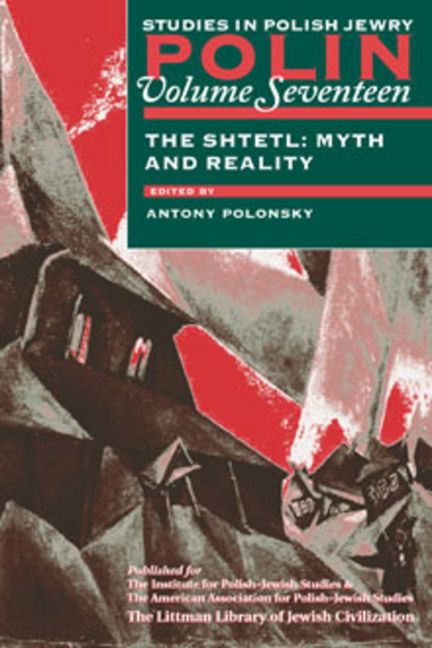Book contents
- Frontmatter
- Dedication
- Editors and Advisers
- Preface
- Polin
- Polin: Studies inPolish Jewry
- Contents
- Note on Place Names
- Note on Transliteration
- List of Abbreviations
- PART I THE SHTETL: MYTH AND REALITY
- PART II NEW VIEWS
- PART III DOCUMENTS
- PART IV THE SIXTY-FIFTH ANNIVERSARY OF EVENTS IN PRZYTYK: A DEBATE
- If Not a Pogrom, Then What?
- Pogrom? The Polish–Jewish Incidents in Przytyk, 9 March 1936
- It Was No Ordinary Fight
- Life and History
- Letter from Ryszard Fenigsen
- Przytyk and the Market Stall
- PART V REVIEWS
- OBITUARIES
- Notes on the Contributors
- Glossary
- Index
If Not a Pogrom, Then What?
from PART IV - THE SIXTY-FIFTH ANNIVERSARY OF EVENTS IN PRZYTYK: A DEBATE
- Frontmatter
- Dedication
- Editors and Advisers
- Preface
- Polin
- Polin: Studies inPolish Jewry
- Contents
- Note on Place Names
- Note on Transliteration
- List of Abbreviations
- PART I THE SHTETL: MYTH AND REALITY
- PART II NEW VIEWS
- PART III DOCUMENTS
- PART IV THE SIXTY-FIFTH ANNIVERSARY OF EVENTS IN PRZYTYK: A DEBATE
- If Not a Pogrom, Then What?
- Pogrom? The Polish–Jewish Incidents in Przytyk, 9 March 1936
- It Was No Ordinary Fight
- Life and History
- Letter from Ryszard Fenigsen
- Przytyk and the Market Stall
- PART V REVIEWS
- OBITUARIES
- Notes on the Contributors
- Glossary
- Index
Summary
IN a riot in Przytyk sixty-five years ago two Jews and one Polish farmer were killed, several dozen Jewish apartments and shops were destroyed, and more than twenty people were severely beaten. Historians usually call this event a pogrom. In Piotr Gontarczyk's opinion, this label is not correct.
In Przytyk, a small town several kilometres from Radom, 90 per cent of the 3,000 inhabitants were Jews. The town served as a trade centre for neighbouring hamlets. Farmers sold their produce and stocked up on items manufactured by local Jewish artisans. The boycott proclaimed by the Partia Narodowa (National Party), with its slogan ‘Buy from your own kind’, was gaining momentum in 1935, and Przytyk was no exception. Picketers prevented Poles from buying at Jewish shops and stalls, and Jews were excluded from markets. In February 1936 a farmer who bought a sheepskin in a Jewish shop in Przytyk was attacked. His sheepskin was cut with knives and his hands were cut as well. The case ended up in court, with the head of the local cell of the Partia Narodowa accused of inciting the action. He was sentenced to five months in prison, but the Court of Appeal overturned the sentence. Other, similar events did not even reach that point. The propaganda of the Endecja (National Democratic Party) increasingly gained ground, primarily among the very poor local farmers. Among the Jews the sense of danger increased. Rumours circulated that the farmers were preparing a frontal assault on the Jews. Farmers said the same about the Jews, claiming that the Jews were secretly arming themselves. The tiniest incident could have unforeseeable consequences.
By the end of 1935, faced with the gathering strength of the boycott, the increasing power of the local Endecja, and the authorities’ inability or reluctance to intervene, the Jews had organized a self-defence group. Headed by Icek Frydman, the group consisted of some twenty young people. The creation of the self-defence group would have important consequences during the later events.
On Monday 9 March 1936 an annual market called the Kazimierzowski Fair was held in Przytyk. Some 2,000 farmers participated in it. By order of the Radom starosta, the Przytyk police force of five men was reinforced with another eleven policemen. Until approximately 2 p.m. the fair was peaceful.
- Type
- Chapter
- Information
- The Shtetl: Myth and Reality , pp. 385 - 391Publisher: Liverpool University PressPrint publication year: 2004

